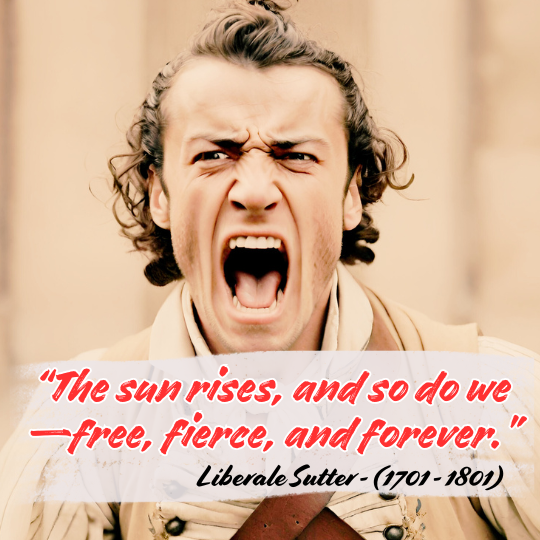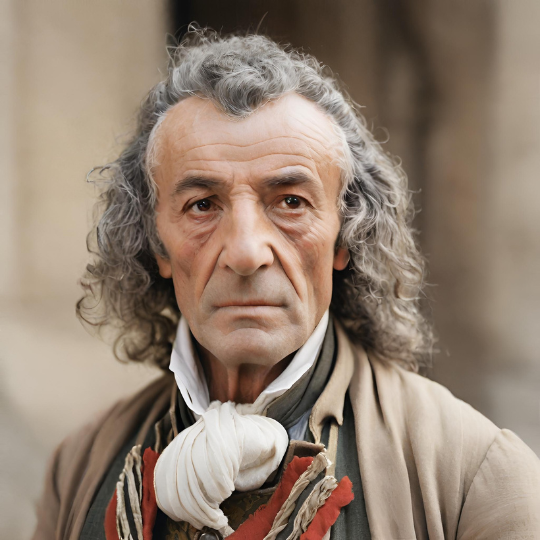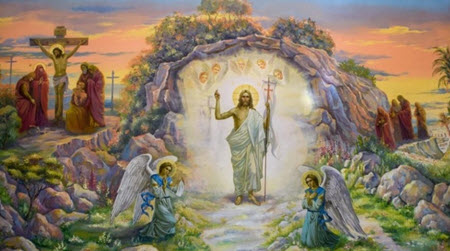Liberale Sutter (1701 - 1801) A Life Unveiled!

In the dimly lit chambers of the Académie des Étoiles, where the scent of ink and parchment hung heavy, a young poet named Liberale Sutter etched his destiny. Born in the quaint village of Étoile-sur-Mer, nestled along the rugged cliffs of the Breton coast, Liberale was destined for greatness—a tempest of words and ideals that would shape the very fabric of a nation.
Early Years: The Quill and the Sword

Liberale’s childhood was a symphony of salt-laden winds and whispered legends. His father, a fisherman with a heart as vast as the Atlantic, taught him the ancient ballads of sea monsters and mermaids. But it was his mother, a seamstress with eyes like storm clouds, who ignited the fire of rebellion within him. She whispered the forbidden verses from Voltaire and Rousseau, her fingers stitching liberty into every seam.
At seventeen, Liberale left Étoile-sur-Mer, his quill and ink tucked alongside a rapier. The French wars raged—the clash of empires echoing across Europe. He fought alongside the Breton rebels, their blood staining the cobblestones of the beautiful French cities: Verdantia, where the sun-kissed vineyards hid secrets darker than the wine they produced; and Avalon, the city of spires, where masked revolutionaries plotted beneath moonlit arches.
The Philosopher’s Labyrinth
Between battles, Liberale pondered the labyrinth of existence. His treatises on limited government and individual sovereignty ignited fervor among the intelligentsia of his day. In the smoky cafés of Café des Ombres, he debated with philosophers, Élodie de Lumière, the enigmatic existentialist, and Thibault le Fou, who believed the universe was a cosmic pastry.

In 1771, Liberale Sutter published his magnum opus, The Whispering Republic, which spoke of a utopian land beyond the veil—a place where heavy taxation was but a distant memory, and the scent of freedom lingered like fine jasmine. The established Académie des Étoiles trembled as they read his words, inked in midnight blue.
The Duel at Dawn
Liberale’s pen was mightier than the sword, but sometimes ink spilled into blood. In the gardens of Château d’Écarlate, he faced his nemesis - Comte Lucien du Sang - a tax collector with a penchant for cruelty against widowed women. As the dueling hour approached, the dawn painted the sky with hues of betrayal as a confident Du Sang sneered, "Your ideas won’t save you now."
As the duel began, Liberale and du Sang circled, blades flashing like forgotten constellations. An errant lunge by Du Sang, was his doom. Liberale side-stepped the lunge, turned and pierced the vile tax-collector's throat with the precision of a surgeon. The morning after the famed duel, Liberale’s quill— as if forged from the bones of fallen poets—danced with purpose. “I fight for a France unshackled,” he declared. The duel was a sonnet of steel and honor, ink staining the dew-kissed grass.
Legacy and the Elysian Fields
 Liberale Sutter’s life was a tapestry woven with threads of rebellion. He penned verses that echoed through Parisian alleys, where lovers whispered secrets and beggars sang hymns to forgotten gods. His death, at the age of one hundred, was shrouded in mystery. Some claimed he ascended to the Elysian Fields, where Voltaire awaited with a flask of celestial wine.
Liberale Sutter’s life was a tapestry woven with threads of rebellion. He penned verses that echoed through Parisian alleys, where lovers whispered secrets and beggars sang hymns to forgotten gods. His death, at the age of one hundred, was shrouded in mystery. Some claimed he ascended to the Elysian Fields, where Voltaire awaited with a flask of celestial wine.
Raise your goblet to Liberale Sutter—the poet who bled ink and courage, the philosopher who dared to dream of a world beyond kings and taxes. His legacy endures, etched in the annals of history, where the stars themselves may still whisper his name.



